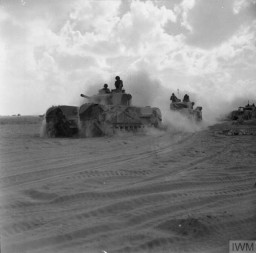You searched for: %EC%98%A8%EB%9D%BC%EC%9D%B8%20%EC%8A%AC%EB%A1%AF%20%EA%B0%80%EC%9E%85%EB%A8%B8%EB%8B%88%20WN33.top%20%EC%BD%94%EB%93%9C%3A8899%20%ED%83%91%EC%8A%AC%EB%A1%AF%20%EC%8A%AC%EB%A1%AF%EA%B2%8C%EC%9E%84%20%EA%B7%9C%EC%B9%99%20%EC%8A%AC%EB%A1%AF%EA%B2%8C%EC%9E%84%EC%B6%94%EC%B2%9C%20oizs
<< Previous | Displaying results 411-420 of 512 for "%EC%98%A8%EB%9D%BC%EC%9D%B8%20%EC%8A%AC%EB%A1%AF%20%EA%B0%80%EC%9E%85%EB%A8%B8%EB%8B%88%20WN33.top%20%EC%BD%94%EB%93%9C%3A8899%20%ED%83%91%EC%8A%AC%EB%A1%AF%20%EC%8A%AC%EB%A1%AF%EA%B2%8C%EC%9E%84%20%EA%B7%9C%EC%B9%99%20%EC%8A%AC%EB%A1%AF%EA%B2%8C%EC%9E%84%EC%B6%94%EC%B2%9C%20oizs" | Next >>
-
Léon Degrelle
ArticleLéon Degrelle was an extreme right-wing Belgian politician and Nazi collaborator. After the war, he continued to spread pro-Nazi propaganda for decades. Learn more.
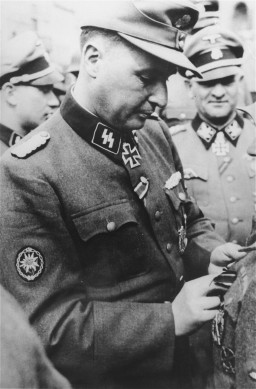
-
David (Dudi) Bergman describes liberation by US Army in mountains near Innsbruck
Oral HistoryThe Germans occupied David's town, previously annexed by Hungary, in 1944. David was deported to Auschwitz and, with his father, transported to Plaszow. David was sent to the Gross-Rosen camp and to Reichenbach. He was then among three of 150 in a cattle car who survived transportation to Dachau. He was liberated after a death march from Innsbruck toward the front line of combat between US and German troops.

-
Life After the Holocaust: Thomas Buergenthal
ArticleAfter WWII and the fall of the Nazi regime, Holocaust survivors faced the daunting task of rebuilding their lives. Listen to Thomas Buergenthal's story.
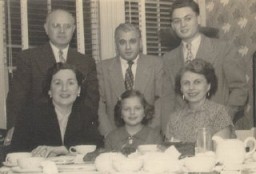
-
Hermann Göring: Key Dates
ArticleHermann Göring held many positions of power and leadership within the Nazi state. Learn about key dates in the life of Hermann Göring.
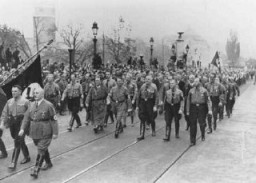
-
Selma Engel diary entry about life in hiding
ArtifactDiaries reveal some of the most intimate, heart-wrenching accounts of the Holocaust. They record in real time the feelings of loss, fear, and, sometimes, hope of those facing extraordinary peril. Selma Wijnberg and Chaim Engel met and fell in love in the Sobibor killing center. After the young couple made a daring escape during the camp uprising and fled into hiding, Selma began a diary to record their experiences. The diary was written in 1943-1944 while Selma was in hiding in German-occupied…
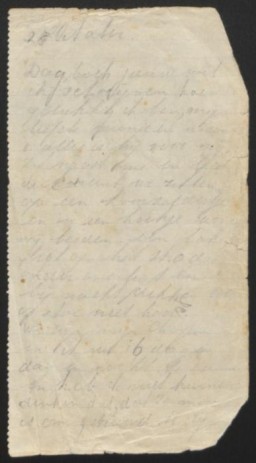
-
Anti-Masonic poster
ArtifactEugenics poster entitled "The relationship between Jews and Freemasons." The text at the top reads: "World politics World revolution." The text at the bottom reads, "Freemasonry is an international organization beholden to Jewry with the political goal of establishing Jewish domination through world-wide revolution." The map, decorated with Masonic symbols (temple, square, and apron), shows where revolutions took place in Europe from the French Revolution in 1789 through the German Revolution in 1919. This…
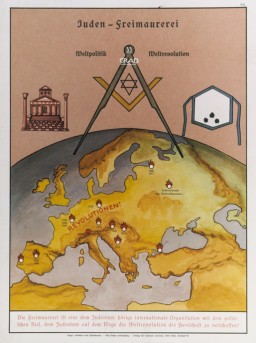
-
Beifeld album page titled "Mementos"
ArtifactCollage entitled: "Mementos from the Russian campaign," which includes a watercolor of Stalin with the caption: 'Russia a meeting place for foreigners 1942-43' (top); a commuter train ticket issued to military personnel who carried the special SAS [Hurry, Immediate, Urgent] draft notice (middle, right); a pseudo travel brochure cover entitled 'Spend your summer vacation in merry Russia' (bottom, left); and the original design for the cover of the labor company's journal entitled 'Hungarian Royal 109/13…
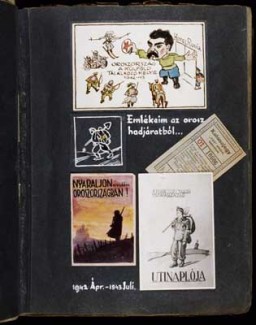
-
Former prisoners of the "little camp" in Buchenwald
PhotoFormer prisoners of the "little camp" in Buchenwald stare out from the wooden bunks in which they slept three to a "bed." Elie Wiesel is pictured in the second row of bunks, seventh from the left, next to the vertical beam. Abraham Hipler is pictured in the second row, fourth from the left. The man on the third bunk from the bottom, third from the left, is Ignacz (Isaac) Berkovicz. [He has also been identified as Abraham Baruch.] Michael Nikolas Gruner, originally from Hungary, is pictured on the bottom…
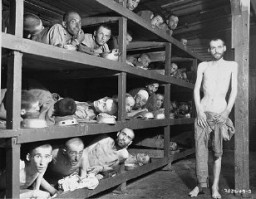
-
Warsaw ghetto uprising, 1943
MapThe city of Warsaw is the capital of Poland. Before World War II, Warsaw was the center of Jewish life and culture in Poland. Warsaw's prewar Jewish population of more than 350,000 constituted about 30 percent of the city's total population. The Warsaw Jewish community was the largest in both Poland and Europe, and was the second largest in the world, behind that of New York City. The Germans occupied Warsaw on September 29, 1939. In October 1940, the Germans ordered the establishment of a ghetto in…

-
Western Desert Campaign: Egypt and Libya
ArticleLearn more about the Western Desert campaign during World War II in Egypt and Libya between 1940-1943.
